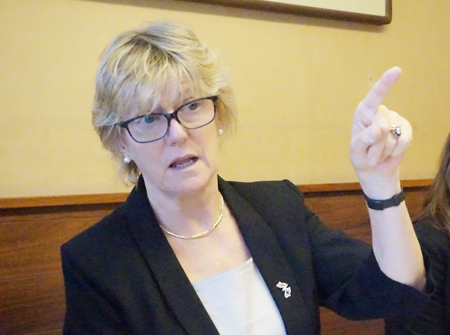- California Assembly OKs highest minimum wage in nation
- S. Korea unveils first graphic cigarette warnings
- US joins with South Korea, Japan in bid to deter North Korea
- LPGA golfer Chun In-gee finally back in action
- S. Korea won’t be top seed in final World Cup qualification round
- US men’s soccer misses 2nd straight Olympics
- US back on track in qualifying with 4-0 win over Guatemala
- High-intensity workout injuries spawn cottage industry
- CDC expands range of Zika mosquitoes into parts of Northeast
- Who knew? ‘The Walking Dead’ is helping families connect
‘Koreans use antibiotics too much’

Dame Sally Davies, Britain’s chief medical officer, speaks during an interview in southern Seoul on Monday. (Courtesy of the British Embassy in Seoul)
By Jung Min-ho
Koreans use antibiotics too much and that could accelerate the “end of modern medicine,” Dame Sally Davies, Britain’s chief medical officer, says.
“It is a concern that Koreans overuse antibiotics,” she said. “Not just Koreans. This is becoming a problem across the world. And we need to raise awareness.”
Davies came to Korea on Sunday to attend the second Global Health Security Agenda High-Level Meeting, which was held at the COEX in southern Seoul from Monday-Wednesday.
Her point is that the world uses antibiotics far more than necessary, which helps the rapid growth of antibiotic-resistant bacteria.
This is a serious problem because, unless a new class of antibiotics is discovered, antibiotics available now could become useless in a few decades, she said. No new class of antibiotics has been found since 1987.
“Modern medicine is supported and underpinned by antibiotics,” she said. “So, what we will begin to see is infections that cannot be treated.”
She noted that bacteria have a capacity to adapt in ways that defeat any antibiotic eventually.
If the fear becomes reality, it could cast the world back to a time when infections often led to amputations.
What every country can do to slow the process at least is to reduce antibiotic use for cases where the patient does not need it, she said.
When it comes to antibiotic use, Korea’s average is 28.4 DDD (defined daily dose), which is higher than the OECD’s average of 20.3 DDD, according to the state-run Health Insurance Review and Assessment Service here.
“There are behavioral issues,” Davies said. “We have to educate patients. They demand antibiotics. Patients say, ‘I need antibiotics.’ Then, doctors find it easier to say, ‘Yes, here is a prescription.’ This must change.”
For viral infections, she noted, patients do not need antibiotics because viruses do not respond to antibiotics. “If it’s a bacterium, then we need to take the correct antibiotic for the correct time _ not too short, not too long,” she said.
What also must be done to tackle the issue is to discover a new class of antibiotics. However, she said, there has been no serious international effort toward that end.
“We need an international system of finance to stimulate or incentivize development of antibiotics,” she said.
For now, the world does not have new antibiotics to replace the ones that work. “That’s a scary picture,” she said. “Maybe not for the next few years, but I worry for my children and grandchildren that we may not have antibiotics, and that will be a problem.”
Davies is the first female to serve as England’s chief medical officer, a position she has held since 2010.
The chief medical officer acts as the government’s principal medical adviser and the professional head of all directors of public health in local government.
















Apa Obat Di Apotik Untuk Penyakit Sipilis
April 28, 2017 at 7:06 PM
Thank you for the information. Hopefully update always let me add my insight. The site I am most waiting for updates
Apa Penyebab Kencing Mengeluarkan Nanah
May 22, 2017 at 7:22 PM
True, this is what I think too. Although somewhat different in opinion about the discussion, but mostly I agree with this site. Hope it always updates so I always increase my insight
Keluar air nanah dari kemaluan
May 22, 2017 at 8:04 PM
I always like what in this site post, always provide the information I need. Hope it always updates so I can add my insight from this site. Thank you